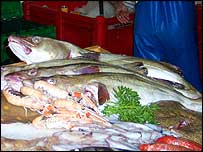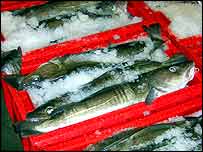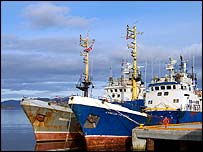|
EUROPEAN CETACEAN BYCATCH CAMPAIGN |
|
|
|
Plenty on sale, but few fish left in the sea |
|
The UK's premier scientific body has now thrown its weight behind efforts to save Europe's declining fish stocks. |
|
Cod remain in huge demand |
|
"If such widespread destruction of a natural resource were happening on the land where we could see it, there would be outrage and condemnation. But because it is happening in our oceans it is all too easy to ignore. The wrangling over quotas by EU fisheries ministers risks making the situation worse. The level of reduction that is adopted is often less than required, due to lobbying by the fishing industry and disputes between different countries. Unless real action to restrain fishing is taken now there could be nothing left to fish in the future." |
|
Russia and Norway now supply |
|
|


